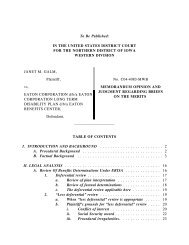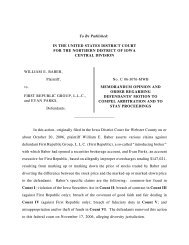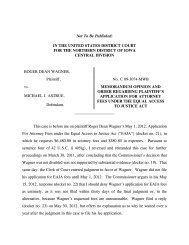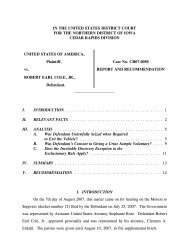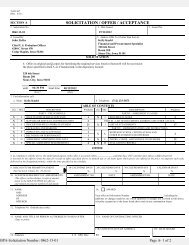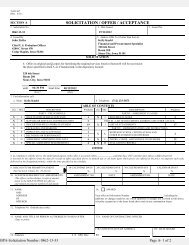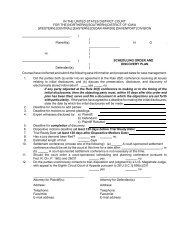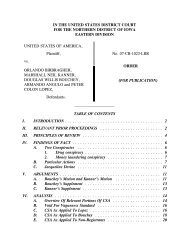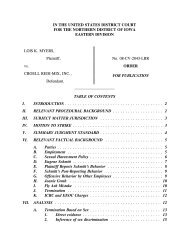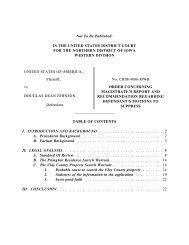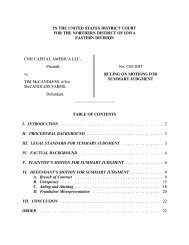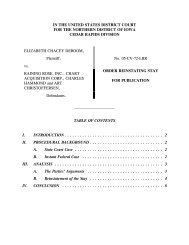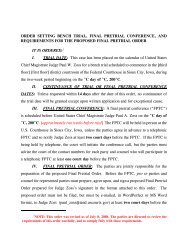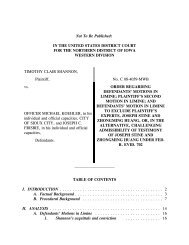Arnzen v. Palmer - Northern District of Iowa
Arnzen v. Palmer - Northern District of Iowa
Arnzen v. Palmer - Northern District of Iowa
Create successful ePaper yourself
Turn your PDF publications into a flip-book with our unique Google optimized e-Paper software.
for permanent relief.” Sierra Club, 645 F.3d at 993 (quoting Winter, 555 U.S. at 32, in<br />
turn quoting Amoco Prod. Co., 480 U.S. at 546 n.12). The Eighth Circuit Court <strong>of</strong><br />
Appeals has noted that this “preferred wording” <strong>of</strong> the standard for success differs<br />
somewhat from the “once familiar” formulation in Dataphase requiring the plaintiff to<br />
show that, “at the very least,” the plaintiff had “established a fair ground for litigation.”<br />
Id. The question is not, however, whether the district court uses the preferred wording,<br />
but whether, in light <strong>of</strong> the evidence, the district court correctly concludes that the plaintiff<br />
is likely to succeed on at least some <strong>of</strong> its claims. Id. at 993-94.<br />
If the plaintiffs were not in any type <strong>of</strong> custody, the monitoring <strong>of</strong> their bathroom<br />
activities obviously would violate their privacy rights. See United States v. Nerber, 222<br />
F.3d 597, 603 (9th Cir. 2000) (“‘[E]very court considering the issue has noted [that] video<br />
surveillance can result in extraordinarily serious intrusions into personal privacy. . . . If<br />
such intrusions are ever permissible, they must be justified by an extraordinary showing<br />
<strong>of</strong> need.’” (alteration in original) (quoting United States v. Koyomejian, 970 F.2d 536, 551<br />
(9th Cir. 1992) (en banc) (Kozinski, J., concurring))). On the other hand, the plaintiffs<br />
would have no right to privacy if they were being confined in a prison rather than in a civil<br />
commitment unit. See United States v. Hogan, 539 F.3d 916, 923 (2008) (“[S]ociety is<br />
not prepared to recognize as legitimate any subjective expectation <strong>of</strong> privacy that a prisoner<br />
might have in his prison cell . . . .” (quoting Hudson v. <strong>Palmer</strong>, 468 U.S. 517, 526, 104<br />
S. Ct. 3194, 3200 (1984))); see also Johnson v. Phelan, 69 F.3d 144, 146 (7th Cir. 1995)<br />
(“[P]rivacy is the thing most surely extinguished by a judgment committing someone to<br />
prison.”). 1 The rights <strong>of</strong> the plaintiffs here fall somewhere between these two situations.<br />
1 “[A] prison inmate has a far lower expectation <strong>of</strong> privacy than do most other individuals in our<br />
society,” G<strong>of</strong>f v. Nix, 83 F.2d 358, 365 (8th Cir. 1986), and retains “very narrow zones <strong>of</strong> privacy.” Hill<br />
v. McKinley, 311 F.3d 899, 905 (8th Cir. 2002). But see Covino v. Patrissi, 967 F.2d 73, 78 (2d Cir.<br />
(continued...)<br />
4



